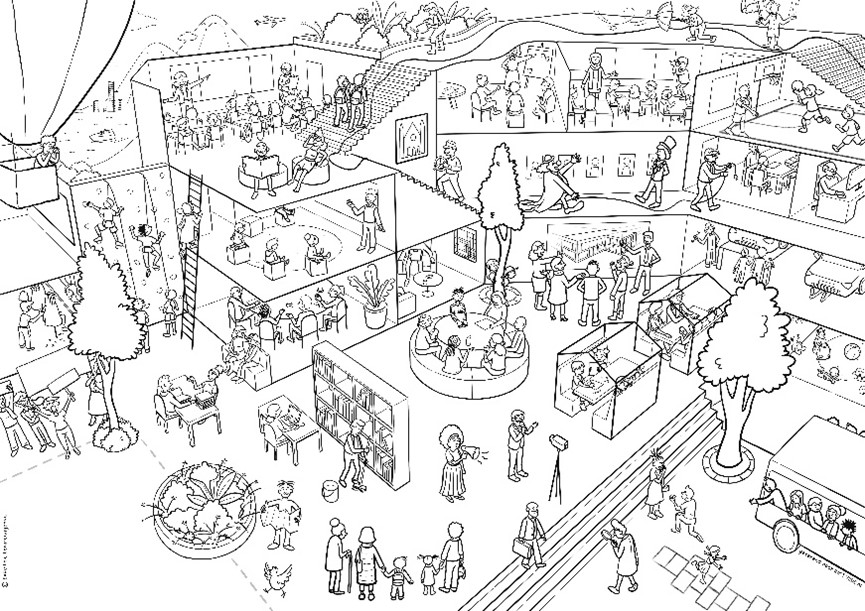Being and Becoming A Research-Active Teacher Educator

How Corona relates to educational change: An impetus for ICT-based teacher education
May 12, 2020
Mentoring as support for professional development
June 23, 2020Being and Becoming A Research-Active Teacher Educator

It’s April 2020 and I’m writing this at home in lockdown during the Covid 19 pandemic. In these terrible times, one of my ways of maintaining a semblance of ‘normal life’ is to take refuge in my research, an enjoyable and – usually - productive process for me. But this was not always so. In my early years as a teacher educator, I struggled to research and write. A brief autobiography will explain why.
I entered teacher education, straight from school teaching, at a time when practical experience was the major recruitment criterion for teacher educators in England. It did not matter in my earliest career stages that I had no doctorate or research experience; I was highly valued as a recently ex-teacher. But then I began to be intrigued by my new occupational group. I asked more experienced colleagues for research about teacher educators’ identities and practices. It seemed, however, that there was little to read; as teachers of teachers, teacher educators were an over-looked group in the research literature at that time.
By then, I had undoubtedly acquired a ‘researchly disposition’ (Tacke & Vanderlinde, 2014). My environment was also changing, with increased valuation of research in teacher education. Charged by scholarly curiosity and supported by that environment then, I began to research teacher educators’ professionality, which led to my doctorate (Murray, 2002). I researched my ‘day job’ in effect, also known as inter-facing research and practice (Pollard, 2005). That doctorate was definitely the most powerful element in my development as a research-active teacher educator, but it was not the only one. Like many post-doctoral researchers in the InFo-TED survey of teacher educators’ learning needs (Czerniawski et al., 2017), I still needed support with developing my research.
As in those survey results, time to research was undoubtedly a major, early-career issue. Meeting the multiple demands of teaching, student support, administration, meetings etc., I found it hard to research and to remember that what is ‘urgent’ is not always ‘important’. Rowena Murray’s books (e.g. 2006; 2014) helped me find both time and the all-important ‘mindspace’ to research. So, as and when I could find that combination, what else helped me? Informed by relevant research on teacher educators’ professional development, below are the principles and practices which helped, and which I now use to support others.
1. Building your ‘brand’ as a researcher – for most teacher educators there are both pragmatic and principled reasons for being a researcher and for their chosen focus. Career progression often requires research engagement, but over and above that, caring deeply about your research and wanting to contribute knowledge in that field are vital. The academic world rewards specialisation and the accumulation of expertise; for most academics, building on doctoral research is key to developing that specialisation. Set clear research targets and aim to achieve them, wherever possible. But also, be open to any serendipitous (happy and unexpected) research opportunities occurring.
2. Finding a ‘research champion’ – that is an academically generous and more experienced researcher, preferably in the same field, who is willing to act as an advisor. This person is a key supporter, offering positive support, honest critique and sense of direction when needed. The research champion will celebrate all successes, but also support when tough critiques of articles or funding applications come in from reviewers (as they always do at some stage). This is a role that goes well beyond research mentoring: the relationship is not ‘one-way’ in the end, because it the more experienced person may not always be advising the ‘novice’, rather both learn from each other.
3. Finding a research network – getting to know people in the relevant research field is key, as is the creation of good networks, both national and international. Wherever possible ensure that networks include good constructive relationships with other stakeholders, as well as academics. Start to create ‘teams’ of like-minded people to work with. All this helps to broaden perspectives, to create channels for dissemination, and to achieve influence. Use conventional publication channels (journal publications, in particular, still matter greatly), but also publish in less formal spaces and use social media to connect with others, to gain new knowledge and to project personal research.
4. Working with the ‘research champion’ and with emerging ‘teams’ from across relevant networks creates further forms of social and academic support, as well as dissemination channels. Engaging in teamwork on empirical or theoretical projects may involve a steep learning curve, but is a powerful form of further learning. Writing with others can be highly beneficial for development, but always ensure that co-writing is done in respectful ways and with due attribution of the levels of effort and inspiration involved. Always agree author order at the beginning of the writing process.
Good luck as a teacher educator researcher. Persevere with all the efforts. Stay safe and well in the wonderful world of research which awaits you, even when the wider world seems grim
.References
Czerniawski, G., Guberman, A., & MacPhail, A. (2017). The professional developmental needs of higher education-based teacher educators: an international comparative needs analysis. European Journal of Teacher Education, 40(1),127-140.
Murray, J. (2002). Between the Chalkface and the Ivory Towers? A study of the professionalism of teacher educators working on primary Initial Teacher Education courses in the English education system. Collected Original Resources in Education, 26(3), 0-550.
Murray, R. (2014) Writing in Social Spaces. London: Routledge.
Murray, R. & Moore, S. (2006). The Handbook of Academic Writing. London: Routledge.
Tack,H & Vanderlinde, R. (2014). Teacher Educators’ Professional Development: Towards a Typology of Teacher Educators’ Researcherly Disposition. British Journal of Educational Studies, 62(3),297-315.
Pollard, A. (2005). Becoming a Researcher. Summary of talk given to NAPTEC on 13/12/05. Downloaded from NAPTEC website 14/12/06. https://www.naptec.org.uk/
Acknowledgements
This blog – and indeed a considerable part of all my work as a researcher and research champion – owes a significant debt to Prof. Andrew Pollard’s work (see above).




